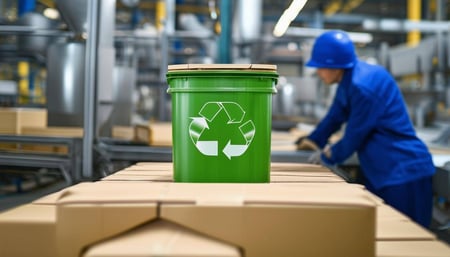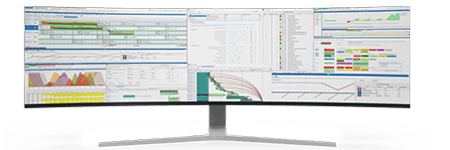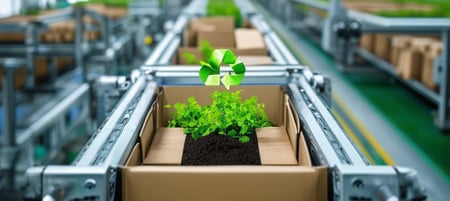Crafting a Value-Based Strategy for Sustainability in Packaging Manufacturing
In the competitive packaging manufacturing landscape, sustainability is no longer a mere buzzword. It has become an essential element of business strategy, driven by increasing regulations, customer demands, and the need for a long-term value-based approach to operations. For Operations Directors in packaging manufacturing, implementing a value-based sustainability strategy can deliver both environmental and financial returns.
Integrating PlanetTogether with enterprise systems like SAP, Oracle, Microsoft, Kinaxis, or Aveva can optimize production processes, reduce waste, and maximize resource efficiency—key components of sustainable manufacturing.
In this blog, we’ll explore how a value-based sustainability strategy can drive performance and how integration with advanced systems supports these initiatives.
The Case for Value-Based Sustainability
A value-based approach to sustainability moves beyond regulatory compliance, embedding environmental, social, and governance (ESG) criteria into core business operations. This approach benefits a packaging facility by driving efficiencies, enhancing brand reputation, and reducing the environmental footprint across the value chain. For Operations Directors, adopting this approach means aligning sustainability goals with financial performance, ensuring that every eco-conscious decision has quantifiable value for the business.
In a value-based sustainability model, companies can focus on:
Resource Optimization: Reducing the use of raw materials and energy consumption in production.
Waste Minimization: Enhancing production efficiency to reduce waste and improve yields.
Supply Chain Transparency: Offering full visibility of material sourcing, product lifecycle, and emissions.
Integrating PlanetTogether with major ERP systems supports these objectives by enabling better decision-making, streamlining operations, and providing actionable data.

Sustainability-Driven Operations in Packaging Manufacturing
Packaging manufacturing is resource-intensive, with substantial energy, water, and raw materials required throughout the production process. The rise of eco-conscious consumers and stricter regulations means Operations Directors must balance sustainability with efficiency. A value-based sustainability strategy encourages the use of alternative, eco-friendly materials, energy-efficient production techniques, and methods for waste reduction.
The key areas where packaging manufacturers can implement sustainable practices include:
Material Usage: Utilizing recyclable, biodegradable, or compostable materials to minimize environmental impact.
Energy Management: Shifting to renewable energy sources, optimizing energy usage, and reducing dependency on fossil fuels.
Waste and Emissions: Decreasing emissions by enhancing operational efficiency, minimizing scrap, and adopting closed-loop recycling.
By using PlanetTogether’s capabilities alongside ERP systems such as SAP, Oracle, or Microsoft, manufacturers can not only track and optimize these sustainability metrics but also ensure that every step in production adds value to the company’s sustainability objectives.
![]()

Integrating PlanetTogether with ERP Systems to Support Sustainability Goals
Integration between PlanetTogether and ERP systems such as SAP, Oracle, Microsoft, Kinaxis, or Aveva offers a holistic view of production, inventory, and resource planning. PlanetTogether’s advanced scheduling and optimization capabilities, combined with the extensive data processing and analysis features of ERP systems, provide a powerful platform for managing sustainability metrics effectively.
Key Integration Benefits
Enhanced Resource Planning and Efficiency
PlanetTogether’s integration with ERP platforms offers advanced production scheduling and resource optimization, aligning production plans with sustainability goals. By analyzing production schedules in real-time, Operations Directors can make adjustments that reduce resource consumption and prevent overproduction, minimizing waste.
Improved Data-Driven Decision-Making
Combining PlanetTogether with ERP systems allows packaging manufacturers to gain real-time insights into resource usage, waste levels, energy consumption, and environmental impact. These insights enable Operations Directors to make more informed decisions to improve operational sustainability without sacrificing efficiency.
Streamlined Waste Reduction and Reuse
Through predictive analytics and machine learning, PlanetTogether’s software, coupled with ERP data, can analyze production processes to identify areas with high waste output. This information allows packaging manufacturers to implement continuous improvement initiatives that reduce waste generation and improve recycling processes.
Increased Supply Chain Visibility
Integrating PlanetTogether with ERP systems like SAP or Oracle offers end-to-end visibility into the supply chain, allowing manufacturers to trace raw material sourcing, manage supplier relationships, and track product lifecycles. This level of transparency enables manufacturers to identify and address the environmental impact of their sourcing practices.

Best Practices for Operations Directors in Developing a Value-Based Sustainability Strategy
To successfully implement a value-based sustainability strategy, Operations Directors should consider the following best practices:
Define Clear Sustainability Goals Aligned with Business Objectives
Begin by identifying specific sustainability goals, such as reducing greenhouse gas emissions by a set percentage, achieving zero waste in production, or transitioning to 100% recyclable packaging materials. These objectives should be measurable, realistic, and closely aligned with the company’s financial and operational goals.
Utilize Data-Driven Tools for Tracking and Reporting
Leveraging data from PlanetTogether and ERP systems, Operations Directors can monitor sustainability metrics and report on them effectively. Regular tracking of data such as energy consumption, waste levels, and production efficiency provides a solid foundation for understanding the impact of sustainability initiatives.
Implement Continuous Improvement in Production Processes
Use the combined capabilities of PlanetTogether and ERP systems to implement lean manufacturing principles, streamline workflows, and enhance process efficiency. By minimizing downtime and waste through optimized scheduling, Operations Directors can increase production efficiency while achieving sustainability goals.
Foster a Culture of Sustainability Across the Organization
Encourage employees at all levels to contribute to the company’s sustainability goals. By cultivating a culture that values environmental stewardship, employees will be more likely to suggest improvements, adopt eco-friendly practices, and take responsibility for reducing waste and inefficiencies.

Measuring Success and Demonstrating Value
To maintain momentum, it’s essential to measure and demonstrate the success of sustainability efforts. Operations Directors can track key performance indicators (KPIs) to assess the value generated by sustainability initiatives. These KPIs may include:
Waste Reduction Percentage: Measure the reduction in scrap and excess materials in production processes.
Energy Consumption: Track energy usage per unit produced and set targets for reduction over time.
Recyclable Material Usage: Monitor the percentage of recyclable and renewable materials used in packaging.
Carbon Footprint Reduction: Calculate reductions in greenhouse gas emissions as a result of process improvements.
The combined data from PlanetTogether and ERP systems can provide insights into these KPIs and demonstrate the financial and environmental return on sustainability investments.
A value-based approach to sustainability is not just an ethical choice—it’s a smart business strategy. For Operations Directors in packaging manufacturing, integrating PlanetTogether with ERP systems like SAP, Oracle, Microsoft, Kinaxis, or Aveva allows for streamlined, efficient production that aligns with sustainability goals. By reducing waste, optimizing resource use, and making data-driven decisions, packaging manufacturers can meet regulatory demands, satisfy customer expectations, and ensure the long-term viability of their operations.
In the packaging manufacturing environment, where consumers and stakeholders alike expect responsible production practices, the integration of advanced scheduling software with ERP systems is not just advantageous; it’s essential for competitive sustainability. Embrace this integration as a pathway to achieving sustainable operations, adding measurable value, and securing a stronger, greener future for the packaging industry.
Are you ready to take your manufacturing operations to the next level? Contact us today to learn more about how PlanetTogether can help you achieve your goals and drive success in your industry.
Topics: PlanetTogether Software, Integrating PlanetTogether, Reduce Waste, Increased Supply Chain Visibility, Packaging Manufacturing, Enhanced Resource Planning and Efficiency, Improved Data-Driven Decision-Making, Streamlined Waste Reduction and Reuse






















LEAVE A COMMENT